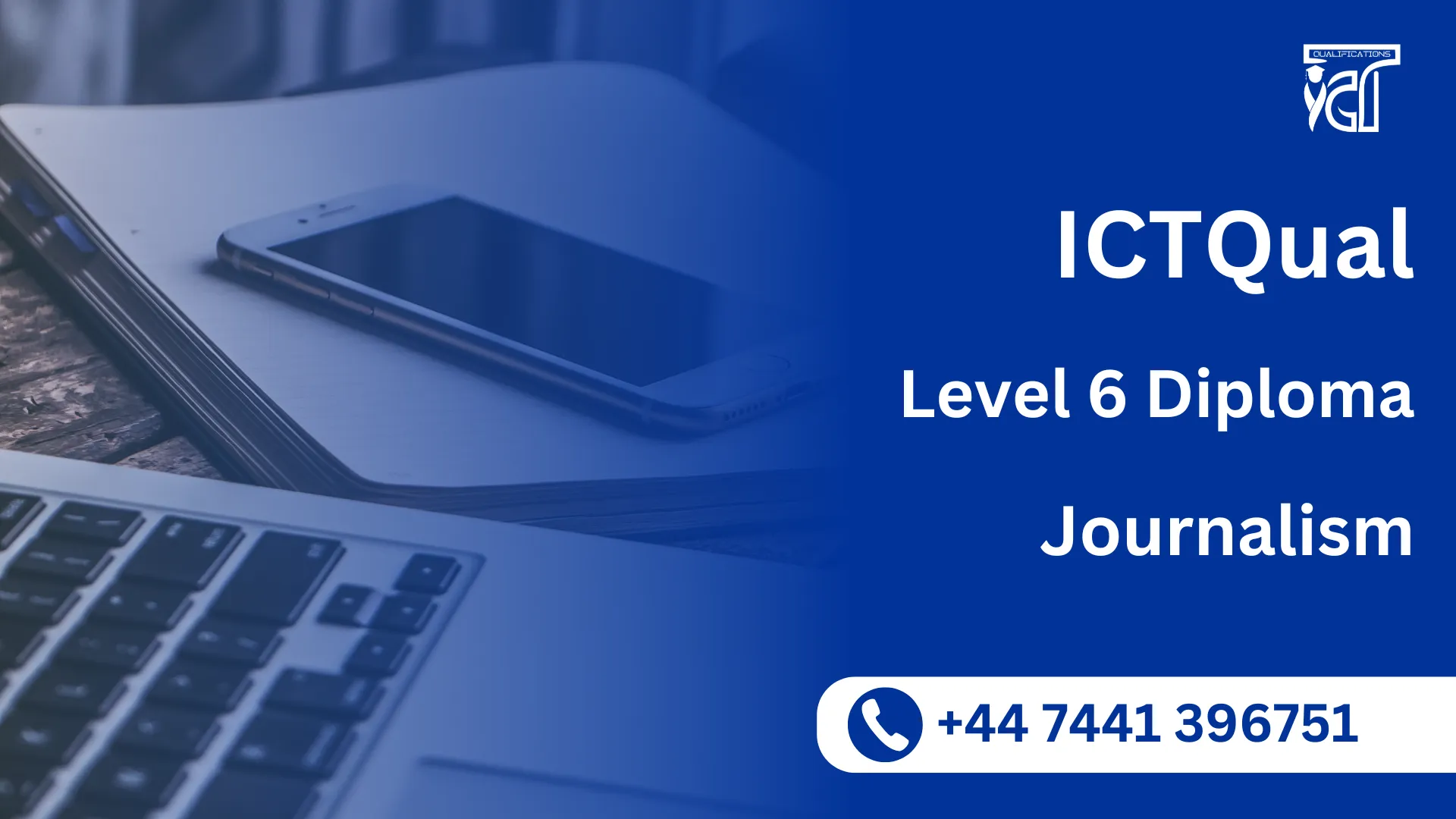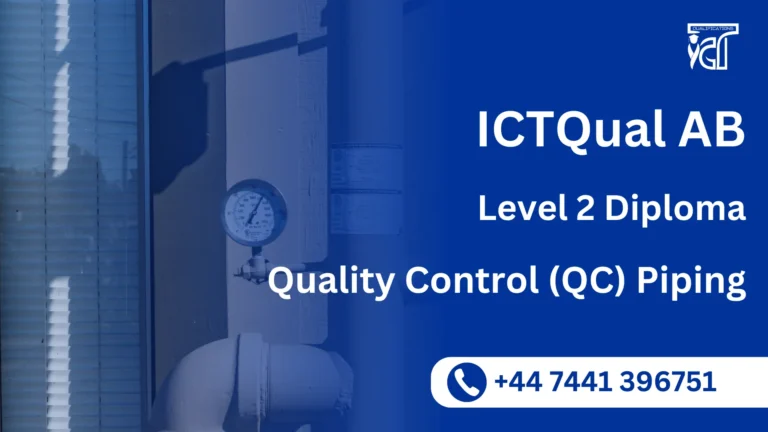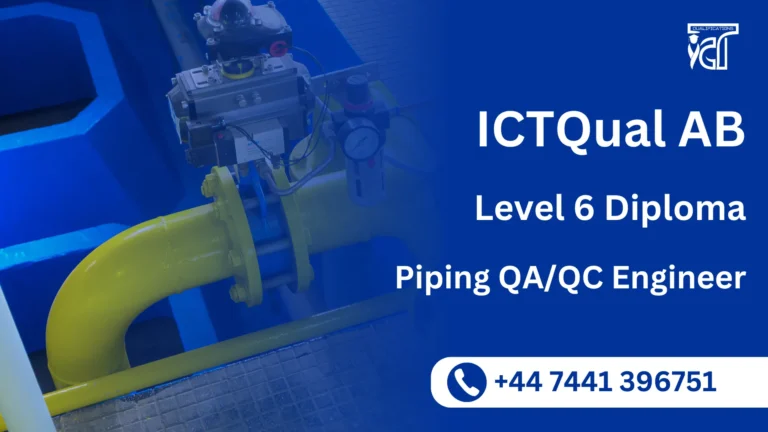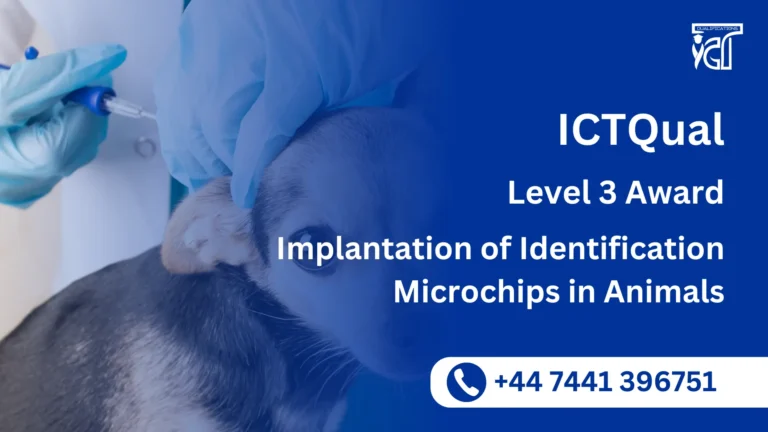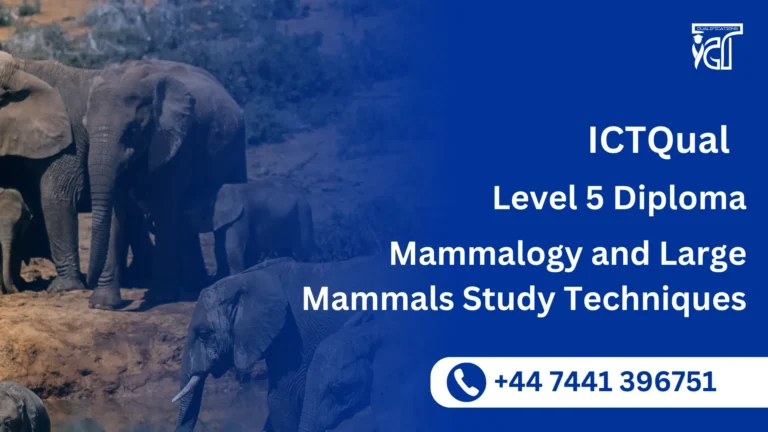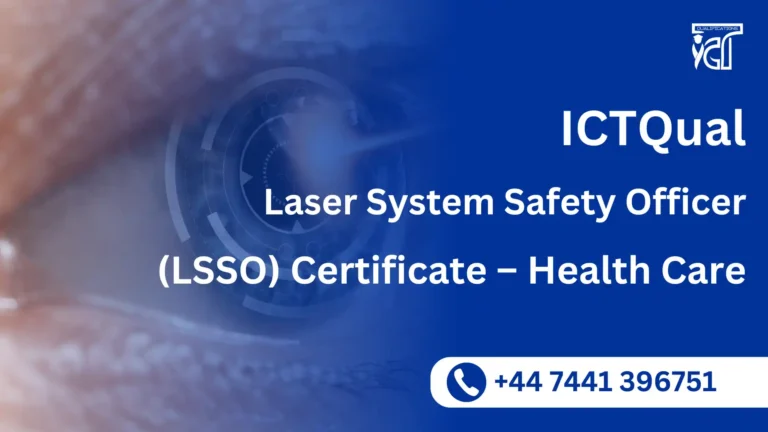The ICTQual Level 6 Diploma in Journalism is an advanced qualification designed to equip learners with the professional skills, critical knowledge, and ethical grounding required to excel in modern journalism. This program emphasizes both theoretical understanding and practical application, preparing participants to navigate the complexities of global media environments with confidence and integrity.
In today’s fast-changing media landscape, journalists must be able to adapt to digital transformation, respond to diverse cultural contexts, and uphold the highest standards of accuracy and fairness. This diploma provides learners with advanced training in investigative reporting, editorial management, multimedia production, and cross-platform storytelling, ensuring they are ready to meet the demands of contemporary journalism.
The course integrates real-world case studies, newsroom simulations, and applied projects to strengthen learners’ ability to produce credible, engaging, and impactful content. Participants will explore topics such as media ethics, international communication, and the role of journalism in shaping public opinion, while also developing practical skills in editing, interviewing, and digital publishing.
Ultimately, the ICTQual Level 6 Diploma in Journalism prepares learners for senior roles in media organizations, freelance journalism, and communication sectors worldwide. It also serves as a pathway to further academic progression and leadership opportunities, empowering participants to contribute meaningfully to the future of journalism in a globalized, digital-first era.
ICTQual Level 6 Diploma in Journalism
This qualification, the ICTQual Level 6 Diploma in Journalism, consists of 6 mandatory units.
| Sr# | Unit Title |
| 1 | Editorial Strategy and Newsroom Leadership |
| 2 | Advanced Investigative Journalism and Data Analysis |
| 3 | International Media Law, Ethics, and Policy |
| 4 | Multimedia Production and Digital Innovation |
| 5 | Strategic Reporting and Public Affairs Communication |
| 6 | Professional Journalism Practice and Industry Engagement |
Learning Outcomes for the ICTQual Level 6 Diploma in Journalism:
Editorial Strategy and Newsroom Leadership
Upon completing this unit, learners will be able to:
- Develop and implement effective editorial strategies that align with organisational objectives and audience expectations.
- Demonstrate strong leadership and management skills within newsroom environments.
- Coordinate editorial teams to ensure efficient content production and publication workflows.
- Apply decision-making principles to balance news value, ethical considerations, and public interest.
- Manage newsroom resources, deadlines, and digital tools to optimise productivity.
- Foster collaboration and innovation across cross-functional editorial teams.
- Evaluate audience insights and analytics to refine editorial direction and engagement strategies.
- Cultivate a culture of accountability, accuracy, and inclusivity in newsroom operations.
Advanced Investigative Journalism and Data Analysis
By the end of this unit, learners will be able to:
- Apply advanced investigative reporting techniques to uncover complex stories.
- Use data analysis tools to identify patterns, trends, and evidence-based narratives.
- Conduct in-depth research using open-source intelligence (OSINT) and digital databases.
- Maintain ethical standards and source protection in investigative journalism.
- Verify information and cross-check facts to ensure accuracy and credibility.
- Develop detailed investigative reports supported by statistical and qualitative data.
- Present investigative findings effectively across digital and traditional media formats.
- Manage project timelines and legal risks associated with investigative reporting.
International Media Law, Ethics, and Policy
After completing this unit, learners will be able to:
- Interpret key international media laws, policies, and regulations affecting journalism.
- Apply ethical principles to news reporting, publishing, and content distribution.
- Evaluate the balance between freedom of expression and responsibility to the public.
- Understand defamation, privacy, copyright, and intellectual property rights in journalism.
- Analyse case studies of global media ethics and regulatory frameworks.
- Develop editorial guidelines that reflect legal compliance and ethical integrity.
- Recognise the implications of misinformation, bias, and censorship in modern media.
- Promote transparency, accountability, and fairness in journalistic practices.
Multimedia Production and Digital Innovation
On successful completion of this unit, learners will be able to:
- Create multimedia content using advanced digital tools for web, social, and broadcast platforms.
- Integrate visual storytelling, audio production, and video editing techniques into journalistic work.
- Apply design thinking and innovation to enhance audience engagement.
- Optimise multimedia content for diverse platforms, including mobile and social media.
- Employ emerging technologies such as AR/VR, AI, and data visualisation in journalism.
- Manage digital workflows from concept development to publication.
- Evaluate multimedia project effectiveness through analytics and user feedback.
- Adapt content strategies to align with evolving digital consumption trends.
Strategic Reporting and Public Affairs Communication
Upon completing this unit, learners will be able to:
- Analyse complex political, economic, and social issues for strategic reporting.
- Communicate public affairs information clearly and objectively to diverse audiences.
- Build professional relationships with stakeholders, institutions, and public bodies.
- Evaluate the role of journalists in influencing policy and public opinion.
- Report accurately on government processes, international relations, and civic developments.
- Use investigative and analytical techniques to produce insightful public affairs reports.
- Apply ethical and legal frameworks to sensitive political communication.
- Develop media campaigns that support transparency and informed citizenship.
Professional Journalism Practice and Industry Engagement
After completing this unit, learners will be able to:
- Demonstrate professional conduct and ethical awareness in all aspects of journalism.
- Apply newsroom standards and editorial procedures in real-world contexts.
- Build a professional portfolio showcasing diverse journalistic outputs.
- Collaborate with industry professionals and media organisations through placements or projects.
- Engage in reflective practice to improve personal performance and career readiness.
- Adapt to emerging technologies, audience behaviours, and media trends.
- Understand global journalism markets and international career pathways.
- Exhibit strong critical thinking, time management, and problem-solving skills in media operations.
The ICTQual Level 6 Diploma in Journalism is designed to provide learners with advanced knowledge, practical expertise, and ethical grounding to succeed in the global media industry. This qualification emphasizes investigative reporting, editorial management, and multimedia storytelling, preparing participants for senior roles in journalism and communication.
Skill Development
- Master advanced reporting and investigative journalism techniques
- Strengthen editorial and content management skills across platforms
- Develop expertise in multimedia production and digital publishing
- Enhance critical thinking and analytical skills for complex issues
- Apply ethical frameworks to ensure accuracy, fairness, and impartiality
Career Preparation
- Prepare for senior roles in print, broadcast, and digital media
- Gain practical newsroom experience through case studies and applied projects
- Build a professional portfolio showcasing advanced journalistic work
- Increase employability with internationally recognized journalism skills
- Develop leadership qualities for managing editorial teams and projects
Professional Growth
- Adapt to technological changes and digital-first media strategies
- Strengthen cross-cultural communication and global awareness
- Improve ability to report on international political, social, and cultural issues
- Foster innovation in storytelling and audience engagement
- Build resilience and accountability in professional journalism practice
Organizational Impact
- Contribute to the credibility and sustainability of media organizations
- Support institutions in delivering transparent and ethical journalism
- Provide strategic insight for editorial direction and content planning
- Enhance organizational adaptability in globalized media environments
The ICTQual Level 6 Diploma in Journalism is designed for individuals who already possess foundational knowledge or practical experience in media and communication and are ready to advance into more senior, specialized roles. This qualification suits learners who want to refine their reporting, editorial, and multimedia skills while gaining a deeper understanding of global journalism practices.
Aspiring Senior Journalists
- Journalists seeking to progress into advanced reporting or editorial positions
- Learners motivated to strengthen investigative and analytical journalism skills
- Individuals aiming to manage editorial processes and contribute to newsroom leadership
- Candidates eager to produce impactful content across print, broadcast, and digital platforms
- Learners preparing for senior responsibilities in media organizations
Career Changers & Professionals
- Media professionals transitioning into journalism from communication, PR, or related fields
- Individuals with prior industry experience seeking formal recognition of their skills
- Candidates aiming to enhance employability in international media environments
- Learners interested in combining practical journalism with strategic communication expertise
- Professionals wishing to broaden career pathways into editorial and content management
International Learners
- Participants motivated to understand journalism in diverse cultural and political contexts
- Learners aiming to adapt to global media environments and digital-first strategies
- Individuals interested in ethical governance and transparency in reporting
- Candidates seeking internationally recognized qualifications for career mobility
- Learners committed to fostering collaboration across multicultural teams
Progression-Oriented Candidates
- Learners preparing for advanced qualifications such as Level 7 Diplomas in Journalism or Media Leadership
- Individuals aspiring to roles such as senior reporters, editors, or communication directors
- Candidates motivated to contribute to innovation and sustainability in journalism
- Learners aiming to strengthen resilience and accountability in professional practice
The ICTQual Level 6 Diploma in Journalism provides learners with advanced knowledge and professional skills that open pathways to senior roles in media organizations and further academic development. This qualification strengthens investigative, editorial, and multimedia expertise, enabling participants to progress confidently in both professional and educational directions.
Academic Progression
- Progression to ICTQual Level 7 Diploma in Strategic Journalism and Media Leadership
- Opportunity to pursue advanced qualifications in media management, communication, or international journalism
- Access to specialized programs in investigative journalism, digital transformation, or media ethics
- Eligibility for executive-level training in leadership and organizational governance
- Foundation for continuous professional development in global media practices
Career Pathways
- Senior editorial roles such as Editor, Managing Editor, or News Director
- Leadership positions in broadcast, print, and digital media organizations
- Opportunities in corporate communication, public relations, and media consultancy
- Roles in international agencies, NGOs, and cultural organizations requiring media expertise
- Freelance opportunities in investigative reporting, multimedia storytelling, and content development
Professional Growth
- Strengthen global perspective in journalism and communication
- Develop resilience and accountability for managing complex newsroom challenges
- Enhance adaptability to technological changes and digital-first strategies
- Build credibility as a professional committed to ethical and transparent journalism
Entry Requirements
Learners must meet the following criteria to be considered for admission into the course:
- Age Requirement: Minimum age of 19 years or above
- Educational Background: Completion of a Level 5 qualification or equivalent in journalism, media, communication, or related fields. Candidates with substantial professional experience may be considered in place of formal qualifications
- Work Experience: At least 2–3 years of relevant industry experience in journalism, media, or communication preferred. Experience in reporting, editorial coordination, or newsroom management is strongly valued
- English Language Proficiency: Good command of spoken and written English is essential, as the program is delivered entirely in English. International learners may be asked to provide evidence of proficiency through recognized language tests (e.g., IELTS, TOEFL, or equivalent)
Register Now
Qualification Process
Qualification Process for the ICTQual Level 6 Diploma in Journalism
- Self-Assessment:
Begin by evaluating your eligibility to ensure you meet the qualification requirements, including work experience, knowledge, and language proficiency. - Registration:
Complete your registration by submitting the required documents, including a scanned copy of a valid ID, and paying the registration fee. - Induction:
An assessor will conduct an induction to confirm your eligibility for the course and explain the evidence requirements. If you do not meet the criteria, your registration will be cancelled, and the fee will be refunded. - Assignments & Evidence Submission:
Provide all assignments and the necessary evidence based on the assessment criteria outlined in the course. If you are unsure of the required evidence, consult with the assessor for guidance on the type and nature of evidence needed. - Feedback and Revision:
The assessor will review your submitted evidence and provide feedback. Evidence that meets the criteria will be marked as “Criteria Met,” while any gaps will be identified. You will be asked to revise and resubmit if needed. - Competence Evidence:
Submit final evidence demonstrating that all learning outcomes have been met. This evidence will be marked as “Criteria Met” by the assessor once it is satisfactory. - Internal Quality Assurance (IQA):
The Internal Quality Assurance Verifier (IQA) will review your evidence to ensure consistency, quality, and compliance with standards. - External Verification:
The IQA will submit your portfolio to ICTQUAL AB External Quality Assurance Verifiers (EQA) for final confirmation. The EQA may contact you directly to verify the authenticity of your evidence. - Certification:
Upon successful completion of all checks, ICTQUAL AB will issue your official certificate, confirming that you have attained the ICTQual Level 6 Diploma in Journalism

